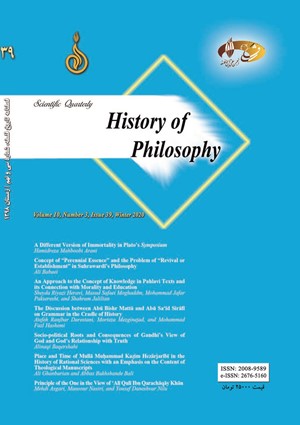-
-
List of Articles
-
Open Access Article
1 - Editor's Note
Hossein Kalbasi Ashtari -
Open Access Article
2 - A Study of the Philosophical Elements of Platonic-Plotinian Tradition in Khwājah Naṣīr al-Dīn Ṭūsī’s Philosophy
Seyed Morteza Honarmand -
Open Access Article
3 - Substance and Essence of Aristotle’s Ousia and its Translation into Substance and Reality
Hamid Khosravani Hamidreza Mahboobi Arani -
Open Access Article
4 - Priority of Sophia to Phronesis and its Significance in Aristotle’s Philosophy of Ethics
Ali Nazemi Ardakani Reza Davari Ardakani Malek Hosseini -
Open Access Article
5 - Term and Definition Based on Sadrian and Sinan Philosophies
Narges Vanaei Mansur Imanpour Sohrab Haghighat -
Open Access Article
6 - Explaining Fārābī’s Teleological View of Music
Mohsen Habibi Seyed Mohsen Mousavi -
Open Access Article
7 - A Comparative Study of Poetics of Aristotle and Ibn Sīnā Regarding the Nature of Poetry
Farideh Daliri Esmail BaniArdalan Amir Maziyar -
Open Access Article
8 - A Glance at one Century of Translation of Philosophical Texts in Iran (Bibliography of Western Philosophers from the Beginning of the 20th Century until Now)
Saeed Anvari Maryam Mahdavi Mazdeh
-
The rights to this website are owned by the Raimag Press Management System.
Copyright © 2017-2026







